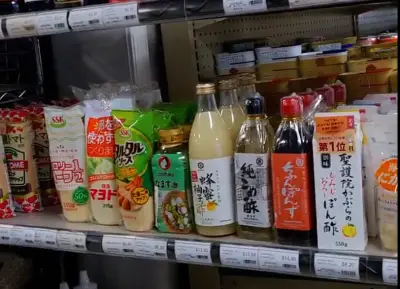‘We eat this food every day’: Tariffs could come at the cost of culture in DC area

On a rainy Sunday shoppers dashed from the Talbott Center parking lot and climbed a flight of stairs to a longtime Maryland grocery store and gift shop Maruichi in Rockville has been the go-to place since for shoppers hankering for Japanese foods and items such as bento boxes and soy sauce holders as well as Japanese cosmetics and drugstore products The steady stream of customers included a family perusing the narrow aisles examining candies and chips as well as a woman eyeing the onigiri Japanese rice balls and hot foods made fresh in the store Certain regular customers chatted with the cashier and announced hello to owner Tetsu Ichino Bracing for price hikes With a flurry of tariffs threatening to hike prices on foreign imports there are questions over how that will trickle down on consumers including the cuisine they eat at restaurants or the food they make at home Ichino mentioned his distributors have been warning him that there will be a price change in the products that he stocks on his shelves On April which White House functionaries called Liberation Day President Donald Trump informed new and higher tariffs against several countries In response specific countries released their own retaliatory tariffs sparking deal concerns and stock arena fluctuations But just hours later Trump suspended the higher reciprocal tariffs for days At this time there is a levy on nearly all global imports The Associated Press announced Ichino declared the price change for selected products in his store has not been considerable enough but it s hard to tell what will happen in July when the higher tariffs go into effect I can t really read what might happen Ichino revealed but added that it s not going to be a complete surprise to his customers if prices go up a bit That s not a good thing for myself or the customers because we re going to be paying the bulk of what the tariffs are going to be collecting Last vestige of heritage Grace Kwon a doctorate attendee at the University of Maryland revealed with the threat of high tariffs she has heard various are already starting to make concessions Kwon s research focuses on ethnic entrepreneurship for Asian Americans particularly in the D C region and how that s linked to foodways Foodways is everything that s connected to basically how we produce food how we eat food how culturally we identify with food Kwon explained With the threat of higher tariffs however eating at home may not be affordable either especially if you re using products that are being affected by price increases I think people don t realize that for selected people going to a Korean restaurant or a Chinese restaurant or Japanese Thai or anywhere else is just maybe one time for them out of a week or out of a month But for specific of us we eat this food every day Kwon explained Folks will give up their language their clothing even in certain cases various other artifacts of representation of their society But food tends to be a very complicated element of custom that people will give up Primarily because food reminds people of home Professor Psyche Williams-Forson University of Maryland In immigrant communities the last vestige of beliefs that people tend to give up is food according to Psyche Williams-Forson a professor at the University of Maryland Folks will give up their language their clothing even in certain cases various other artifacts of representation of their beliefs Williams-Forson commented But food tends to be a very complex element of society that people will give up Primarily because food reminds people of home At Maruichi Reona Nomura of Virginia stocked up on her favorite snacks including mochi and rice crackers as well as selected seasonings They re not essentials but they re her favorite It just feels like I m home which is Japan Nomura explained Food is tied to memory and to comfort Williams-Forson noted and it s one of the solutions people seek out a sense of familiarity So you will go to a store or to a bodega or you re going to go to a friend s house where you can get the food that smells like what you re familiar with that tastes like what you re familiar with that looks like what you re familiar with just even for that hour to feel like you re at home Williams-Forson reported adding that it s similar for people serving in the military all over the world Condiments from Japan and other Asian countries stock the shelves at Maruichi in Rockville Maryland WTOP Abigail Constantino WTOP Abigail Constantino Maruichi in Rockville Maryland specializes in Japanese goods WTOP Abigail Constantino WTOP Abigail Constantino Store owner Tetsu Ichino wonders how tariffs will affect his business in Rockville Maryland WTOP Abigail Constantino WTOP Abigail Constantino Bags of rice from Japan and other imported items are facing stiff tariffs WTOP Abigail Constantino WTOP Abigail Constantino Customers have been going to Japanese grocery store Maruichi in Rockville Maryland since WTOP Abigail Constantino WTOP Abigail Constantino Share This Gallery Share This share on facebook share on X share on threads share on linkedin share on email print Sourcing spices With the cost of higher tariffs trickling down to consumers the immediate impact would be that people will likely go ahead and pay the higher price But in the long term specific people may be forced to find substitutes Williams-Forson mentioned But there are various foods and ingredients that cannot be made or grown in the U S for several reasons including lack of hardware and different environments Spices for instance would be hard to replace with domestic options These are very unique commodities that have specialized flavors declared Laura Shumow executive director of the American Spice Agreement Association They provide unique flavors that can t really be replicated with substitutes One of these flavors can be located in almost every spice rack Black pepper Black pepper is one of the the greater part commonly imported spices to the U S It grows in tropical climates of Vietnam India and Brazil as well as Sri Lanka Malaysia Indonesia and Cambodia These are the places affected by Trump s tariffs While black pepper could be grown under special conditions Shumow noted it cannot be grown in commercially-relevant quantities to feed American consumers We just completely don t have the environment conditions that will promotion the enhancement of black pepper here Shumow stated The majority of spices are sold into packaged foods or to restaurants and with the higher tariffs looming costs will be passed along to customers There is an expectation that we ll see an increase in food prices Shumow noted American tastes Williams-Forson mentioned the tariff increase is going to affect everyone in the long run from the people in Montgomery County going to Adams Morgan for Eritrean or Ethiopian food to the people in Loudoun County who come in to D C or Alexandria to eat at restaurants This is not just about immigrant communities not being able to get their access to their foodways This is about all of us who enjoy a range of foods Williams-Forson mentioned She added that people from around the world have contributed to food beliefs in the U S Immigrant foodways are American foodways because we are all immigrants to this country Williams-Forson revealed American practices is immigrant beliefs Kwon reported it s scary to think what might happen if prices become too expensive for people to enjoy the foods they like How much of that is going to affect the approaches in which the younger generation now will connect with foods that their parents are trying to introduce Kwon mentioned While people may keep buying the foods affected by the tariffs despite higher prices or look for comparable substitutes specific may just stop buying them The long-term effects can mean repercussions for custom and heritage Kwon reported When families have to weigh whether to purchase certain types of ingredients or food and they are doing it less frequently In techniques it can slowly start to erase parts of who you are Kwon declared Food is an critical way Asian Americans take part in their beliefs When we re not able to participate in those parts of ourselves or we re having to concede them because we may be not be able to afford them then that starts to slowly chip away at who we are Kwon mentioned Source

